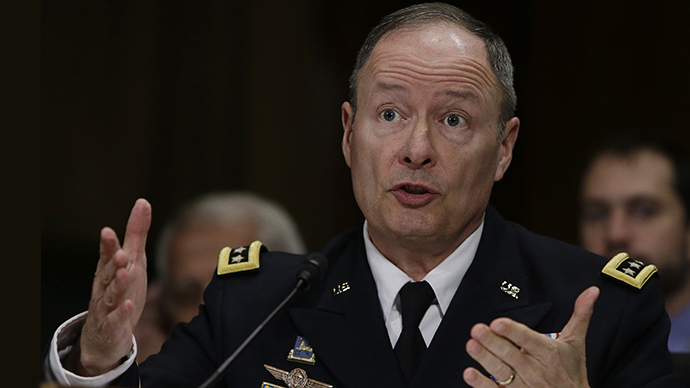Limit surveillance to ‘terrorist communication,’ says outgoing NSA boss

General Keith Alexander, the soon-to-be departed chief of the NSA, admitted Thursday in front of a congressional committee that the massive intelligence agency may be open to extracting less, or more targeted metadata from communication companies.
Classified documents leaked last summer by NSA whistleblower Edward Snowden revealed that the intelligence agency currently compels at least three major telephone providers – Verizon, Sprint, and AT&T – to turn over call information on millions of Americans. Among that information, known as metadata, is the duration of the call, the time the call was made, who the phone call was to, and where it originated.
Snowden disclosed a trove of secret information about US intelligence activity to the press, but the collection of phone metadata has been perhaps the most controversial, in part because of its sheer breadth.
Senator Carl Levin (D-MI) was among those hoping to find more when, at a Senate Armed Services Committee hearing, he asked Alexander how the metadata is collected and stored.
“Chairman, I think there are three options that you put on the table,” Alexander replied. “You mentioned the government holding it, the ISPs holding it. I think there is yet another option where we look at what data you actually need and only get that data.
“Can we come up with a capability that just gets those that are predicated on a terrorist communication? I think you have those three options that I’ve put on the table,” he continued. “Those are three of the ones that I think need to be clearly discussed and the merits from both sides, they have pros and cons on the agility that you would have with the program.”
Alexander was referring to possible reforms to the NSA set forth by US intelligence and law enforcement leaders earlier this week. US President Obama, who has said he is open to reforming the surveillance programs after public scrutiny, tasked the attorney general and other administration officials to propose theories on how the phone metadata collection program could remain in use.
The most radical proposal, according to anonymous sources who spoke to the Wall Street Journal, would be to entirely abandon the collection of telephony metadata. Officials are also considering turning that vast datalog over to a government agency other than the NSA – either the FBI or Foreign Intelligence Surveillance Court, perhaps.
Alexander’s testimony seemed to indicate that the scenario the administration is taking most seriously is leaving the trove metadata with the phone company, with the NSA only forcing the company to handover information about numbers thought to be involved in a web of terrorism.
It’s impossible to guess exactly what Alexander’s intentions are, though, because of the general’s reputation as a surveillance hawk. One unnamed intelligence source told the Washington Post in 2013 that Alexander organized the mass collection of Iraqi telecommunication information as a measure against terror attacks on US troops there. That official implied that Alexander had brought the same approach stateside.
“Rather than look for a single needle in the haystack, [Alexander’s] approach was, ‘Let’s collect the whole haystack,’” he said. “Collect it all, tag it, store it…And whatever it is you want, you go searching for it.”
Alexander, the public face of the NSA, has kept that stance even in the face of public pressure and questions from lawmakers. He said in October that the NSA could scale back the eavesdropping on foreign leaders, but that the indiscriminate interception should continue, even if the data is turned over to a third party.
“I would love to give this hornet’s nest to someone else, to say: ‘You get stung by this.’ But don’t drop it, because that’s our country, and if you drop it, the chance of that a terrorist attack gets through increases,” he said.
Previous reports indicated that the outgoing Alexander would relinquish his position as director by March or April 2014. Administration sources insisted that plans for his departure had been in the works before the Snowden leak, but the agency has been dogged by question and criticism for more than six months.
“The true tragedy in all this is the way the press has articulated [the NSA] as the villains when what they are doing is protecting the country and [doing] what we have asked them to do,” Alexander said.














